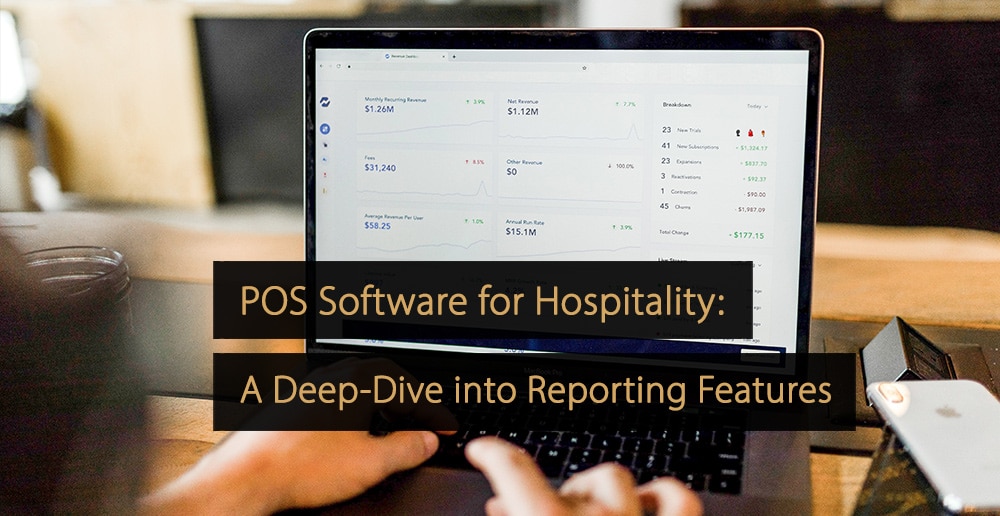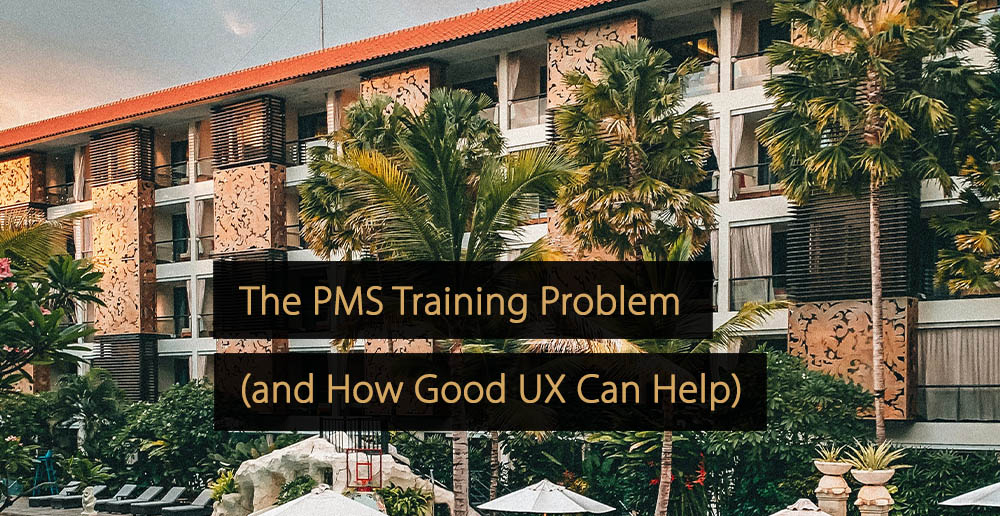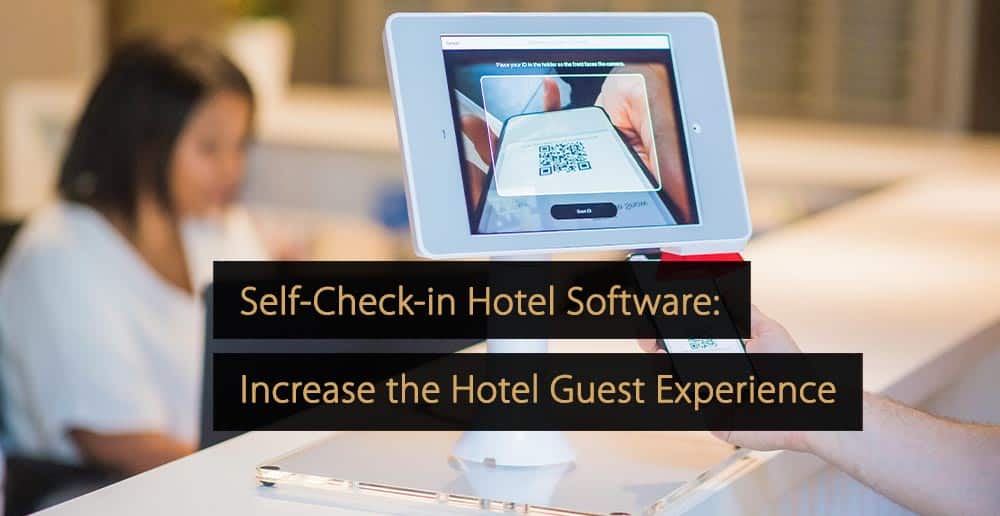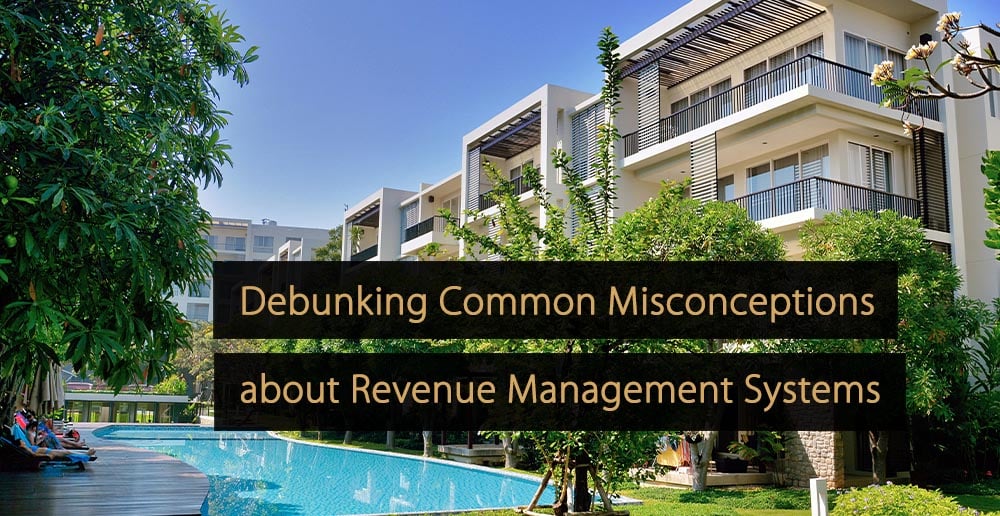POS software ranks among the most important technology solutions for hotels, restaurants, and other businesses in the hospitality industry. Aside from its core features, which allow for the processing of various payment options, the software can also be used for reporting. In this article, you will learn more about these reporting features, how they work, what they can offer, and how they can be successfully leveraged to improve business performance.
Table of Contents:
- What is POS Software?
- What is a POS Software Report?
- Types of POS Software Reports
- Additional Features of POS Software Analytics & Reports
- POS Software and Other Software Tips for Hospitality
- POS Software and Systems in Hospitality: An Overview
- The Main Benefits of POS Software for Hotels
- POS Software in Restaurants: Current and Future Trends
- Make the most of POS Software and Systems in Hospitality
- POS Software: How to Decide Between Apps
- POS Software and Other Software Tips for Hospitality
What is POS Software?
POS software is the name of software solutions that power point-of-sale (POS) systems. The software is designed to streamline retail operations and process payments, including card payments, cash payments, and payments made using mobile wallets. Yet, POS systems’ uses in the hospitality industry go much further.
POS software can link up with wider company data, ensuring that any sales processed through the system are reflected across the board while allowing POS software to be used for everything from inventory management to upselling, cross-selling, and creating fully customizable point-of-sale software reports.
What is a POS Software Report?
A POS software report is the name given to any report that is produced through the use of point-of-sale software. These reports can take many forms because modern POS systems have access to a large amount of company data and can contribute to tracking that data, ensuring it is always completely up-to-date.
Essentially, point-of-sale software reports in the hospitality industry focus on making hospitality data more accessible or visual. This could make it easier to interpret hard numbers, such as key performance indicators, or sales figures, and it can also assist businesses with identifying trends or significant data patterns.
Ultimately, the purpose behind many POS software reports is to present company data so senior staff can understand the current state of play and make more evidence-based decisions. These reports can also help track progress and present important information to all relevant stakeholders.
Types of POS Software Reports
While point-of-sale software in hospitality can be used to create and present reports, it is important to understand that these reports can take many forms. In the sections below, you will be able to find out about the main types of POS software reports, what they tell you, and how they can be used.
Video: Example of Reporting on eZee POS Software
Payment and Sales Reports
As the name suggests, payment and sales reports are designed to track and present important information about sales and payments from customers or business partners. For example, it will generally be possible to create reports where payments are grouped based on the type of payment, when it was made, etc. The information for these reports can be fed into the system directly from the POS system, meaning the data will always be up-to-date.
On the other hand, sales reports can tell you important information about the number of sales made, revenue, profit, and more. This information can then be easily compared to historic data, meaning those in the hospitality industry can use their POS software to track performance over time and identify key sales trends.
Ultimately, the purpose of payment and sales reports from POS software is to allow businesses to understand these aspects of their business better. Such reports can inform you on issues like the methods of payment your customers prefer, the precise products and services that are most popular, and the times of the year when demand is highest and lowest. This allows hotel and restaurant management staff to tailor their offerings more effectively.
Inventory Reports
For those involved with hospitality management, it is vital to have up-to-date information available about inventory, such as levels of stock or the number of unoccupied rooms, and point of sale system reports can provide precisely this information while ensuring it is easy to understand and capable of providing deeper insights.
Using POS software, it is possible to link sales and inventory together to continually update inventory information when sales are made, or cancellations are confirmed.
At their most basic, this means inventory reports can provide insights into how many rooms are available in a hotel at any point, or how many tables are available in a restaurant. However, it can also tell users how much of a particular product is available so that new stock can be ordered on time. This can even be automated so that the POS system continually updates stock, and then reordering occurs when the stock reaches a defined threshold.
This means that POS software reports can improve the efficiency of stock reordering and help prevent issues associated with items being out of stock. It also means hospitality companies can avoid overselling hotel rooms, restaurant seats, nightclub tickets, etc., so that overbooking and customer disappointment can be avoided.
Inventory reports are essential for high-quality inventory control. Improving inventory processes can also have additional benefits, saving companies money on unnecessary warehouse space and ensuring stock is reordered at the best possible time, so that costs and missed sales are kept to an absolute minimum.
Employee Reports
Employee reports are another type of report that hotel and restaurant technology like point-of-sale software can help to create. One of the main reasons this is possible is because POS software can track the performance of individuals, such as the number of sales they make, or the amount of revenue they bring in through upselling and cross-selling.
From there, reports can be made detailing who the top performers are over a particular period so that they can be adequately compensated. This kind of tracking also allows managers to see how sales performance changes over time so that employees can be rewarded for improvement or alerted to drops in performance.
However, while performance tracking is one of the most significant ways POS software in hospitality can inform employee reports, it is far from the only way. When employees who process payments arrive in the workplace, they can use the POS system to sign in and sign out again at the end of the day. When this becomes policy, the software can track work hours more accurately, improving the efficiency and accuracy of payroll work.
Meanwhile, in restaurants and settings where tips are regularly given, POS software can produce relevant reports about which employees or teams generate the most tips. This information can then be used to inform training and coaching efforts. The practices and techniques used by those bringing in the most money can then be taught to those not performing so well, to boost company finances and their take-home pay.
Customer Reports
Finally, POS software can create relevant customer reports with other hospitality technology solutions. This can be crucial for understanding how customers are responding to your business, your strengths and weaknesses, your reputation, and how customers feel about specific products or services.
POS software makes it relatively quick and easy to access information like guest order history in restaurants or hotel guest room service habits. This can help you develop a deeper understanding of your current customer base and the best ways to reach out to them so they can visit again.
Customer POS system reports can inform marketing efforts by improving personalization and ensuring you target marketing messages to the right audience segments. Customer reports may also help you identify interesting trends, such as customers who favor different products, services, or visit times.
Customer data can be continually updated and accessed in real-time, and this can help companies to run effective customer loyalty programs or to provide high-value customers with targeted discounts or special offers.
Ultimately, creating customer reports aims to improve your understanding of existing and potential customers and to use the information gathered to inform strategies, practices, and offerings. This means the reports can enhance the customer experience and improve your business’ reputation.
Additional Features of POS Software Analytics & Reports
Aside from the ability to create the aforementioned report types, POS software can help those in hospitality through several additional features. These extra features are outlined in more detail below:
Mobile Reporting
With cloud-based POS software, hospitality industry employees can access reports from anywhere, using any compatible device. This could be a smartphone, a tablet, or a computer, which means access can be made possible on-site, at home, or when traveling. Storing data in the cloud can help to ensure that it is not dependent on particular devices, or a particular physical location, and it can also help to keep the information more secure.
Advanced Reporting Features
The best point-of-sale software will provide numerous advanced reporting features so hospitality leaders and employees can generate reports just as they like. These advanced features include customization options, templates, various data visualization options, and more. As a result, you will be free to determine what information is included within your reports, what is left out, and how the data is presented.
Scheduling and Distribution
Another useful feature associated with POS software for hospitality is the ability to schedule reports. This means you can set up sales, customer, or employee reports, so they are created at regular intervals, such as weekly, monthly, or annually. Alternatively, you may set it up so that reports are created when data meets set parameters, and you will also have full control over how the reports are distributed.
Hotel-Focused POS Reports
Hotel-focused POS reports are possible within POS software solutions targeted toward the hotel industry. Using these reports, you can track the performance of individual points of sale, such as the bar, restaurant, and reception, and you can monitor performance over time, to identify patterns. Hotel-specific features also allow tracking hotel KPIs, such as RevPAR and GOPPAR, which can greatly improve revenue management.
POS Software and Other Software Tips for Hospitality
Within the hospitality industry, POS software is just one example of a software solution that can help managers, owners, and other senior staff to improve operations. Indeed, one of the keys to lasting success in the industry is knowing how to choose the right software solutions and optimize their use.
Visit the “Software Tips for the Hotel & Hospitality Industry” section to access more articles that can assist hotel and hospitality managers and senior staff make the most of their software solutions.
POS Software and Systems in Hospitality: An Overview
POS software and POS systems are playing an increasingly significant role in the hospitality industry, aiding the collection of accurate data and improving communication while still processing payments. POS software now ranks among the most essential hospitality technology of all.
Check out the “POS Systems: Overview and Importance in the Hospitality Industry”, where you can learn more about how POS systems work, how they are utilized in the hospitality industry, and their overall importance.
The Main Benefits of POS Software for Hotels
Hotels can benefit enormously from the effective use of POS software because it can assist with everything from mobile payment processing to keeping inventory information up-to-date. This means POS software can play a valuable role in record-keeping, performance tracking, revenue management, etc.
Read the “6 Benefits of Point-of-Sale Software for Hotels” article if you are interested in further exploring the uses of POS software within the hotel industry and if you would like to know about six specific benefits.
POS Software in Restaurants: Current and Future Trends
In the restaurant industry, point-of-sale systems have a valuable role to play, but to get the most from your POS software, you need to keep up with the latest trends and the most advanced ways to use it. Furthermore, it is also vital that those in the restaurant industry keep one eye on the future.
Take a look at “Restaurant POS Systems: The Latest and Future Trends” to dive deeper into restaurant POS systems, the most significant current trends to be aware of, and the trends of the future.
Make the most of POS Software and Systems in Hospitality
While POS software in the hospitality industry can assist employees, customers, and senior management, getting the absolute most out of a POS system requires strategic thinking. For instance, it means leveraging POS systems for upselling and cross-selling and training staff to use them in ways that improve customer satisfaction.
The “Maximise the Benefits of Point-of-Sale Systems in Hospitality” article details how POS software and systems can be deployed within hospitality so that the benefits are fully realized.
POS Software: How to Decide Between Apps
Choosing the right POS software is essential, but what goes into finding the right app? First, finding a suitable option based on your budget is important. Still, you also need to consider whether you want a cloud-based or on-premises solution and whether you need specific features, such as a restaurant POS app or a hotel POS app.
Look at the “POS Apps: How to Choose the Right One?” article to learn more about how POS apps can vary and the specific factors you should consider when narrowing down the available options.
POS Software and Other Software Tips for Hospitality
Within the hospitality industry, POS software is just one example of a software solution that can help managers, owners, and other senior staff to improve operations. Indeed, one of the keys to lasting success in the industry is knowing how to choose the right software solutions and optimize their use.
Visit the “Software Tips for the Hotel & Hospitality Industry” section to access more articles that can assist hotel and hospitality managers and senior staff make the most of their software solutions.
POS software within the hospitality industry can serve various functions, but one that businesses need to make the most of is the ability these apps have to assist with reporting. Indeed, the reporting features in POS software solutions allow businesses to create employee, sales, customer, and inventory reports, giving them a better sense of where their business stands, current trends, and what the future may look like.
More Tips to Grow Your Business
Revfine.com is the leading knowledge platform for the hospitality and travel industry. Professionals use our insights, strategies, and actionable tips to get inspired, optimize revenue, innovate processes, and improve customer experience.Explore expert advice on management, marketing, revenue management, operations, software, and technology in our dedicated Hotel, Hospitality, and Travel & Tourism categories.
This article is written by:
Hi, I am Martijn Barten, founder of Revfine.com. With 20 years of experience in the hospitality industry, I specialize in optimizing revenue by combining revenue management with marketing strategies. I have successfully developed, implemented, and managed revenue management and marketing strategies for individual properties and multi-property portfolios.









Leave A Comment